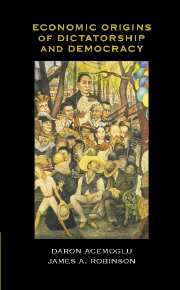More on Empirical Studies
 My post of last week on legal scholarship produced comments on a wide range of topics, and I am still collecting my thoughts on how to further the conversation. For now, I found this book review from last week's issue of Science quite interesting in its comments on the value of empirical studies, the topic which attracted the most attention among comments to my post. This is from a book review by Roman Wacziarg of the Stanford Graduate School of Business reviewing Economic Origins of Dictatorship and Democracy by Daron Acemoglu of MIT and James A. Robinson of Harvard. The book explores "age-old questions in political economy: What factors, particularly economic factors, explain why some countries pass from dictatorship to democracy? What determines whether such transitions will be consolidated or whether a country will revert to rule by a small elite?"
My post of last week on legal scholarship produced comments on a wide range of topics, and I am still collecting my thoughts on how to further the conversation. For now, I found this book review from last week's issue of Science quite interesting in its comments on the value of empirical studies, the topic which attracted the most attention among comments to my post. This is from a book review by Roman Wacziarg of the Stanford Graduate School of Business reviewing Economic Origins of Dictatorship and Democracy by Daron Acemoglu of MIT and James A. Robinson of Harvard. The book explores "age-old questions in political economy: What factors, particularly economic factors, explain why some countries pass from dictatorship to democracy? What determines whether such transitions will be consolidated or whether a country will revert to rule by a small elite?"According to Wacziarg (italics mine for emphasis):
 The book's substantive contribution is to bring ... intellectual traditions together under a consistent theoretical framework, delivering rich empirical predictions on the factors leading to democratization and institutional stability. These factors are the economic, social, and institutional determinants of the costs and benefits of repressing versus conceding, such as the size of the middle class, the structure of production, economic inequality, the prevalence of economic shocks and crises, and the degree of globalization. Each is found to have sometimes complex, but always empirically testable, relationships with the political regime.
The book's substantive contribution is to bring ... intellectual traditions together under a consistent theoretical framework, delivering rich empirical predictions on the factors leading to democratization and institutional stability. These factors are the economic, social, and institutional determinants of the costs and benefits of repressing versus conceding, such as the size of the middle class, the structure of production, economic inequality, the prevalence of economic shocks and crises, and the degree of globalization. Each is found to have sometimes complex, but always empirically testable, relationships with the political regime.***
Yet providing testable theories is not the book's only contribution to scientific knowledge. Another, perhaps more important, contribution is the manner in which its central questions are approached. Economic Origins of Dictatorship and Democracy contributes to social science by addressing issues traditionally studied by political scientists with the rigorous tools of economic analysis. Acemoglu and Robinson use formal game theoretic models, proceeding from assumptions to empirically falsifiable predictions, in keeping with the Popperian tradition. Such an approach is relatively new to political science, in spite of that discipline's name. This is particularly true for the subdiscipline of comparative politics, which still largely relies on rhetoric and anecdotes--rather than mathematically rigorous proofs and large-sample statistical evidence--to explain social phenomena. The authors' work is an admirable illustration of a growing trend toward formal reasoning and the derivation of empirically testable propositions from internally consistent, stylized models. This is a trend that revolutionized economics starting in the middle of the last century. It is now sweeping political science, and the experience of economics suggests it is the way of the future. As it takes hold, the social sciences are bound toward greater and greater consilience.
One feature of scholarship my post suggested that law ought to value more than it traditionally has is greater emphasis on developing testable legal theories as well as actually doing the testing. While we may never get to the point of regularly producing and working with "mathematically rigorous proofs and large-scale statistical evidence," would it hurt us so much to move farther away from relying as much as we do on "rhetoric and anecdotes"?












2 Comments:
J.B.: I haven't read the book yet, and I should, but for a very different take on it by a good, if somewhat non-traditional, economist, see James Galbraith's review: http://www.democracyjournal.org/article.php?ID=6482&PHPSESSID=153af4c5b5aa2a791e0b1b110476e60e (sorry, that doesn't' look good). Galbraith is quite critical of their methodology.
Good point, Brett--just because one employs emprical methods does not mean the methodology is aplied soundly.
Post a Comment
<< Home